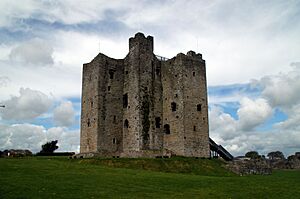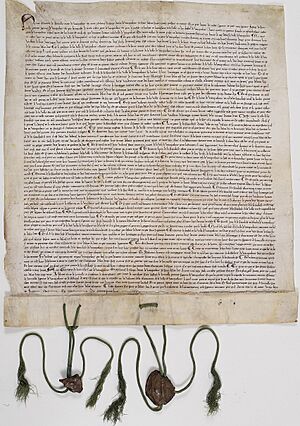Geoffrey de Geneville, 1st Baron Geneville facts for kids
Quick facts for kids
Geoffrey de Geneville
|
|
|---|---|
| 1st Baron Geneville | |

|
|
| Heir | Roger Mortimer and Joan |
| Born | c. 1226 Champagne |
| Died | 21 October 1314 Trim, County Meath |
| Buried | The Black Friary, Trim |
| Wife | Maud de Lacy, Baroness Geneville (1252–1304) |
| Issue | 5 (or more), including Geoffrey, Peter (Piers), and Simon |
| Father | Simon of Joinville |
| Mother | Beatrix d'Auxonne |
Geoffrey de Geneville (born around 1226, died 1314) was an important noble from both England and France. He was also known as Geoffrey de Joinville. He strongly supported King Henry III, who made him the Baron of Trim, County Meath in Ireland. Later, he became a loyal supporter of King Edward I.
Contents
Geoffrey's Family and Marriage
Geoffrey came from Champagne, a region in France. He was the second son of Simon of Joinville and Beatrix d'Auxonne. His older brother was Jean de Joinville.
Geoffrey's mother, Beatrix, had another daughter named Agnes from a previous marriage. Agnes married Peter II, Count of Savoy. This connection helped Geoffrey get a good position at the English royal court. He was one of the "Savoyards" who came to England with Queen Eleanor when she married King Henry III in 1236.
Between 1249 and 1252, King Henry III arranged for Geoffrey to marry Maud de Lacy. Maud was a wealthy widow who owned large lands in Ireland, Herefordshire, and the Welsh Marches. By marrying Maud, Geoffrey gained control of these important estates. His main lands were in Trim, Ireland, and near the Welsh border at Ludlow. Geoffrey and Maud had at least four sons: Geoffrey, Simon, William, and Peter.
Geoffrey's Career in Politics and War
Geoffrey de Geneville was skilled in both military matters and political talks. He helped bring peace between different groups in Ireland. This helped the future King Edward I win an important battle at Evesham. In 1267, he helped King Henry III negotiate with Llywelyn ap Gruffudd, a Welsh prince. This led to the Treaty of Montgomery.
In 1270, Geoffrey joined Edward on a journey called the Eighth Crusade. He also fought in the Welsh Wars. He went on important diplomatic trips to Paris for the king. From 1273 to 1276, he served as the justiciar of Ireland, which meant he was the chief royal officer there. However, he faced difficulties against the Irish in Leinster.
In 1280 and again in 1290, he acted as Edward's special messenger to Paris and to the Pope's court. In 1282, he helped the Marshal of England during the Welsh War. The next year, in 1283, he gave his English lands to his son Peter. He then focused more on his lands in Ireland. He and his wife worked to protect their rights in Trim from the government in Dublin.
In 1297, Geoffrey supported King Edward during a difficult time. Edward needed more soldiers and money for a war in France. Geoffrey was appointed Marshal of England during this crisis. He also received invitations to attend Parliament many times between 1299 and 1306.
Geoffrey's Later Years
Geoffrey's wife, Maud, passed away in 1304. Their eldest son also died before him. In 1308, when he was about 80 years old, Geoffrey gave most of his Irish lands to Roger Mortimer. Roger was married to Geoffrey's granddaughter, Joan, who was his main heir.
Geoffrey then retired to a Dominican monastery called Black Friary in Trim. He had helped establish this monastery in 1263. He died on October 21, 1314, and was buried there. After his death, his granddaughter Joan became the Baroness Geneville.
Images for kids
 | Isaac Myers |
 | D. Hamilton Jackson |
 | A. Philip Randolph |




